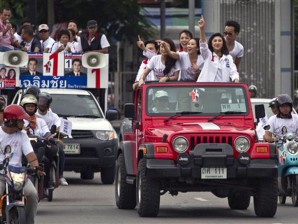Polls open in tense Thai election

Pheu Thai Party prime ministerial candidate Yingluck Shinawatra, right, and others wave to onlookers during the final hours of political campaigning in Thailand's general election. The race is coming down to a choice between Yingluck Shinawatra, the sister ousted former Prime Minister Thaksin Shinawatra, and army-backed Prime Minister Abhisit Vejjajiva. AP Photo
BANGKOK – Thailand began voting on Sunday in a closely fought general election seen as a major test of the kingdom’s ability to resolve a long and bloody political crisis.
Polling stations opened at 8:00 am amid a heavy police presence for the vote, the first since mass anti-government protests in Bangkok last year sparked the country’s deadliest political violence in decades.
This election is seen as pivotal to the future of the deeply divided kingdom, after years of political deadlock and often bloody street protests.
The poll is the first major electoral test for the government since mass opposition rallies paralysed Bangkok last year, scaring away foreign tourists and sparking a military crackdown that left about 90 people dead.
Now the tense vote could herald a comeback for fugitive former premier Thaksin Shinawatra and his political allies.
Article continues after this advertisementOusted in a 2006 military coup and now living in self-imposed exile, the ex-tycoon has tapped his youngest sister to run in his place.
Article continues after this advertisementYingluck Shinawatra, a telegenic businesswoman tipped by many to become Thailand’s first ever female prime minister, is a 44-year-old political novice described by Thaksin as his “clone”.
Polls show the mother-of-one enjoying a comfortable lead over the ruling Democrats, led by Prime Minister Abhisit Vejjajiva, who is fighting for his political life after less than three years in office.
Thaksin remains a hugely divisive figure, adored by millions of rural voters but hated by the ruling elite and wanted on terrorism charges over the 2010 protests by his “Red Shirt” supporters.
His opposition Puea Thai party has proposed an amnesty for convicted politicians if it wins — a move apparently aimed at bringing Thaksin home, where he faces a jail term for corruption imposed in his absence.
But many doubt the Bangkok-based elite in government, military and palace circles would allow the one-time owner of Manchester City football club to come back as a free man.
If Thaksin tries to return the army may “strike back”, said Thai academic Pavin Chachavalpongpun, of the Institute of Southeast Asian Studies in Singapore.
“If he sets foot in Thailand the military could accuse him of coming back and trying to create disunity among Thais.”
The military is a constant wildcard in a nation that has seen almost as many coups as elections, although experts say it will be harder for the military to justify another intervention if Puea Thai scores a big victory.
The judiciary also has a record of banning political parties and their executives. Parties linked to Thaksin have won the most seats in the past four elections, but the courts reversed the results of the last two polls.
In contrast Abhisit’s Democrat Party — the country’s oldest, with a support base in Bangkok and the south — has not won a general election in nearly two decades.
The British-born premier took office in a 2008 parliamentary vote after a court ruling threw out the previous administration, and he is accused by his foes of being an unelected puppet of the military and the establishment.
The vote is seen as a major test of the kingdom’s ability to emerge from its long political crisis, which pits Thaksin’s “Red Shirt” supporters against the rival “Yellow Shirt” royalist protest movement.
Revered King Bhumibol Adulyadej, 83, is seen as a unifying figure in a country often riven by violence, but he has been in hospital since September 2009 and the post-succession landscape is shrouded in uncertainty.
During the eventual transition period the elite “would like to have their own people in charge because it’s such a critical time”, said Pavin.
“Why would they let a Red government whom they accused of nurturing anti-monarchy sentiment to be charge at the time?”
About 47 million people are eligible to vote in the election, which will select 500 members of the lower chamber, the House of Representatives. Polling stations will close at 3:00 pm.